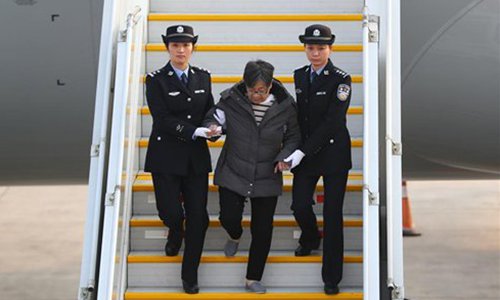HOME >> CHINA
China encourages voluntary confessions from corrupt officials with commute change
By Liu Caiyu Source:Global Times Published: 2019/5/31 20:48:40

Yang Xiuzhu (C) is escorted at Beijing Capital International Airport in Beijing, capital of China, Nov. 16, 2016. China's most wanted fugitive Yang Xiuzhu, who had been on the run for 13 years, returned to China Wednesday and turned herself in to the authorities, according to the Communist Party of China's disciplinary watchdog. (Xinhua/Yin Gang)
Chinese state personnel who commit corrupt acts shall not be eligible for parole unless they confess or repent for their crimes, a newly released regulation said on Friday, which is part of the country's efforts to encourage corrupt officials to voluntarily surrender.
According to the Supreme People's Court regulation, no parole shall be granted and the sentence shall not be commuted if the offender refuses to confess and repent for his crime.
The regulation is part of the nation's effort to encourage corrupt officials to voluntarily surrender and cooperate in the investigation, Zhuang Deshui, deputy director of the Research Center for Government Integrity-Building at Peking University, told the Global Times on Friday.
According to the Central Commission of Discipline Inspection (CCDI) of the Communist Party of China, since the 19th National Congress of the CPC in 2017, a total of 27,000 Party members and officials have voluntarily confessed to violating Party disciplines, and more than 5,000 others have voluntarily submitted their cases to the police.
The new regulation also makes commuting life sentences to shorter imprisonment more difficult.
Those sentenced to life can have a reduced penalty if they meet certain requirement after four years, two years longer than the previous regulation. Those who show genuine repentance or perform meritorious services may be commuted to a maximum fixed-term jail term of 22 years.
The regulation is a supplementary to Provisions of the Supreme People's Court on the Specific Application of Law in Handling Commutation and Parole Cases in 2017. It will be implemented on Saturday.
The regulation applies to those found guilty of bribery in accordance with the Criminal Law that was revised in 2015.
China's anti-corruption system has become stricter over the years, ranging from laws and internal Party disciplines and regulations to the all-round system to curb corruption, such as the disciplinary and supervision departments and the fugitive-chasing mechanism overseas, analysts told the Global Times.